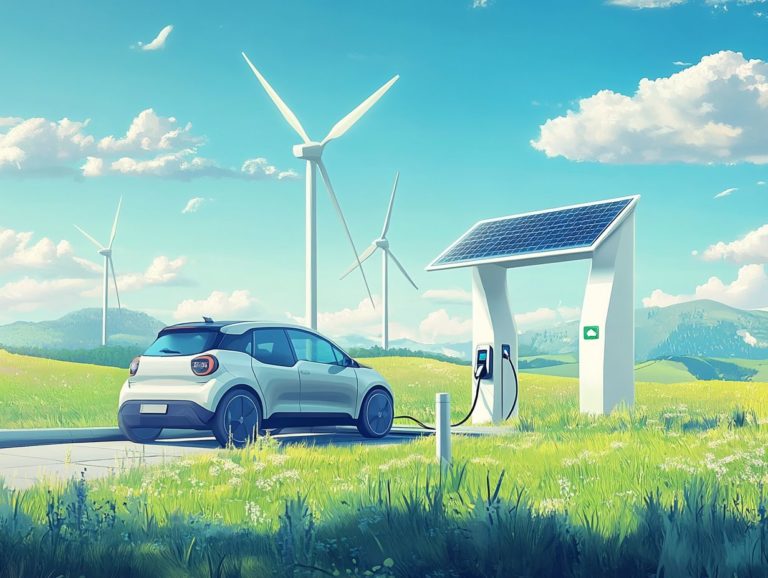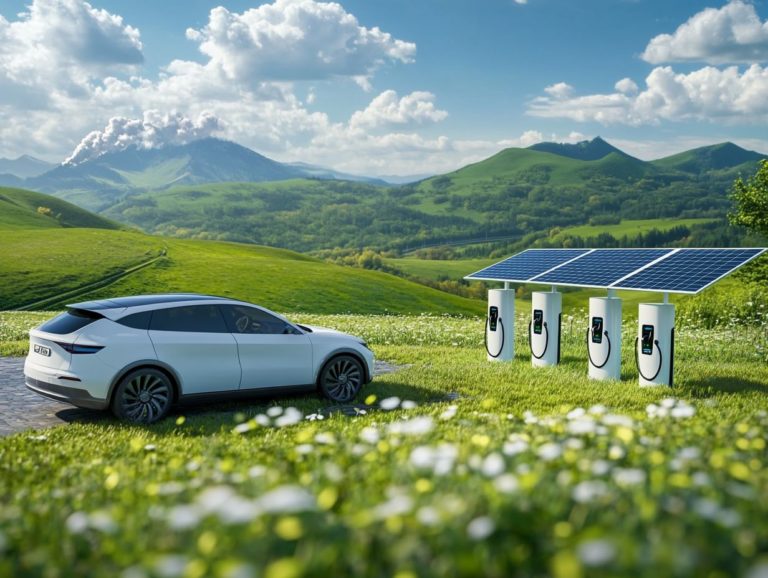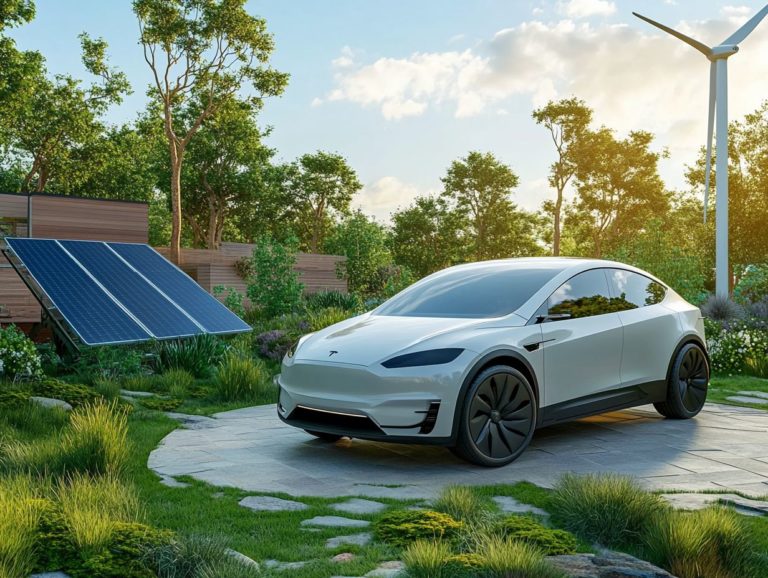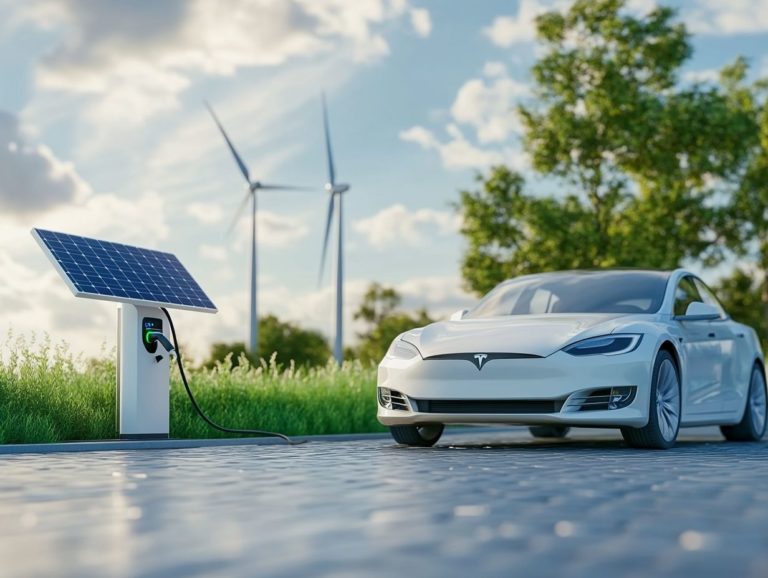The Role of Electric Vehicles in Sustainable Development
As you navigate the pressing challenges of pollution and climate change, it’s impossible to overlook Electric Vehicles (EVs) as a beacon of hope for sustainable development.
This exploration delves into the striking contrast between traditional vehicles and their electric counterparts. It illuminates the myriad benefits of EVs in reducing emissions and enhancing air quality.
But don’t worry! Together, we can overcome the challenges. You’ll discover the current obstacles, government initiatives in play, and the bright future that technology promises for electric vehicles.
Join us now to make a difference as we uncover the pivotal role of EVs in crafting a cleaner, healthier planet.
Contents
- Key Takeaways:
- The Environmental Impact of Traditional Vehicles
- Benefits of Electric Vehicles for Sustainable Development
- Challenges and Limitations of Electric Vehicles
- Government Initiatives and Incentives for Electric Vehicles
- Future Outlook for Electric Vehicles
- Frequently Asked Questions
- 1. What is the role of electric vehicles in sustainable development?
- 2. How do electric vehicles contribute to reducing greenhouse gas emissions?
- 3. Can using electric vehicles really make a difference in promoting sustainable development?
- 4. Are electric vehicles more energy-efficient than traditional gasoline vehicles?
- 5. How do electric vehicles contribute to reducing dependence on fossil fuels?
- 6. Are there any other benefits of using electric vehicles for sustainable development?
Key Takeaways:
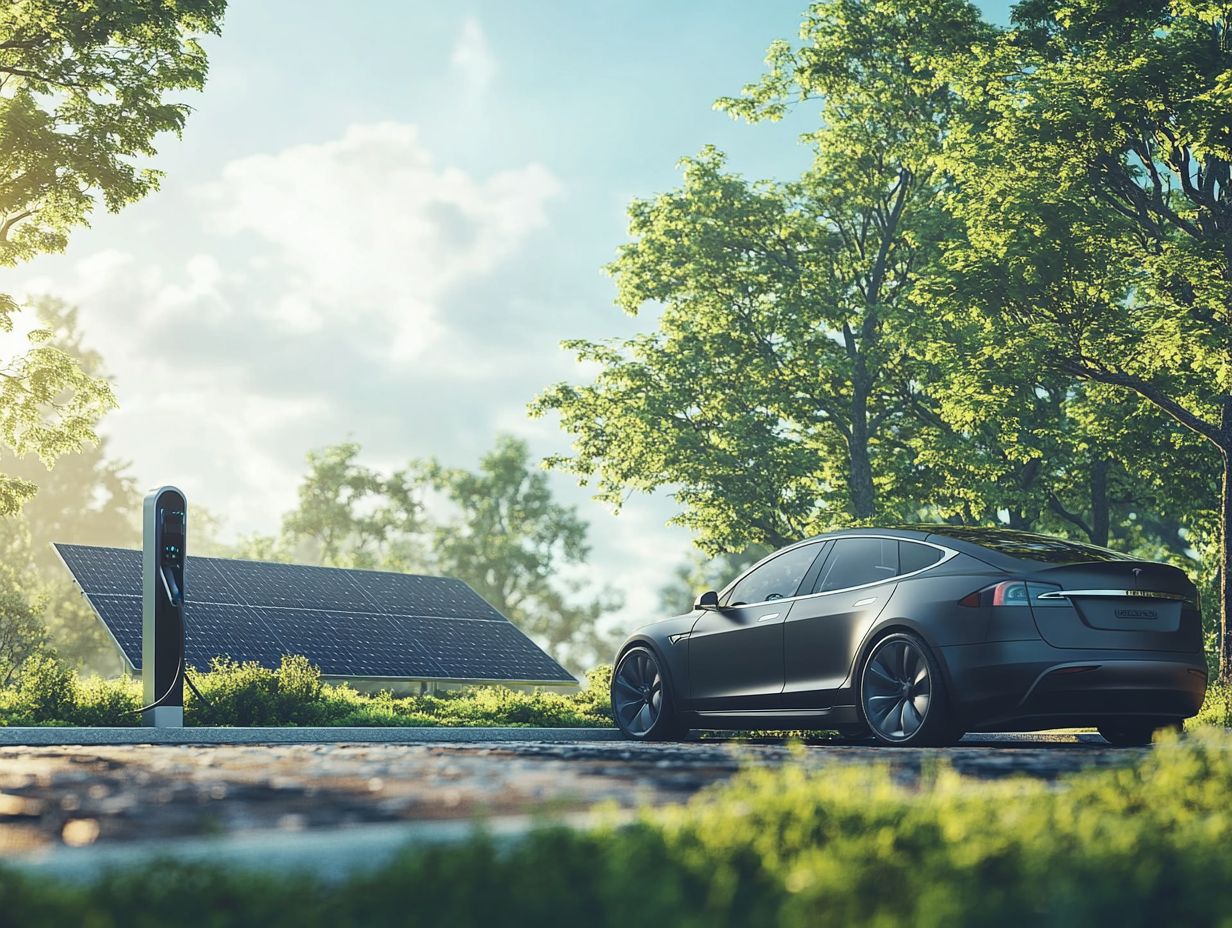
- Electric vehicles help reduce pollution and reliance on fossil fuels.
- Government support and incentives boost the growth of electric vehicles despite challenges.
- Advancements in technology promise a bright future for electric vehicles.
Definition and Overview
Electric vehicles (EVs) signify a transformative shift in the transportation landscape. By utilizing electric motor systems instead of traditional internal combustion engines, they play a crucial role in sustainable development goals, which aim to cut down greenhouse gas emissions the gases that contribute to global warming and tackle climate change.
With global demand surging for cleaner and more efficient vehicles, the electric vehicle industry stands on the brink of remarkable growth. This growth is fueled by breakthroughs in battery technology and renewable energy sources.
You ll find that these vehicles come in various forms battery electric vehicles (BEVs), plug-in hybrid electric vehicles (PHEVs), and fuel cell electric vehicles (FCEVs), which are vehicles that use hydrogen to create electricity. Each offers its own set of unique advantages.
The perks of embracing electric vehicles include lower operational costs, reduced air pollution, and heightened energy efficiency. They harness renewable energy for charging, aligning perfectly with sustainability initiatives.
As urban areas increasingly prioritize green technologies to combat pollution and resource depletion, EVs are emerging as pivotal players in shaping a cleaner, more resilient future. This transition champions sustainable practices while bolstering the growing trend towards energy independence and innovation in smart city developments.
The Environmental Impact of Traditional Vehicles
Traditional vehicles, primarily fueled by fossil fuels, exert a significant environmental impact. They contribute to elevated levels of greenhouse gas emissions and air pollution, which in turn exacerbate climate change and diminish air quality in urban areas worldwide.
Pollution and Climate Change
The transportation sector plays a pivotal role in greenhouse gas emissions, significantly influencing climate change and air quality in urban environments.
Vehicles powered by fossil fuels emit a range of pollutants, including carbon dioxide, nitrogen oxides, and particulate matter. These substances threaten the environment and compromise human health. The implications are serious, with emissions linked to respiratory diseases and cardiovascular issues, especially among vulnerable groups like children and the elderly.
The buildup of these pollutants not only degrades air quality but also exacerbates global warming, as many of these gases effectively trap heat in the atmosphere.
As you navigate the urgent need for sustainable solutions, transitioning to cleaner forms of transportation becomes crucial. This transition mitigates detrimental effects and tackles broader challenges of climate change.
Benefits of Electric Vehicles for Sustainable Development
Electric vehicles play a pivotal role in advancing sustainable development, and understanding the role of public transportation in EV sustainability presents a wealth of benefits that you can’t overlook.
By reducing greenhouse gas emissions, lessening dependence on fossil fuels, and paving the way for job creation in burgeoning sectors dedicated to clean energy transitions, EVs offer an innovative solution that aligns with a sustainable future.
Embracing electric vehicles is not just a choice; it’s a necessity for a healthier planet.
Reducing Emissions and Dependence on Fossil Fuels
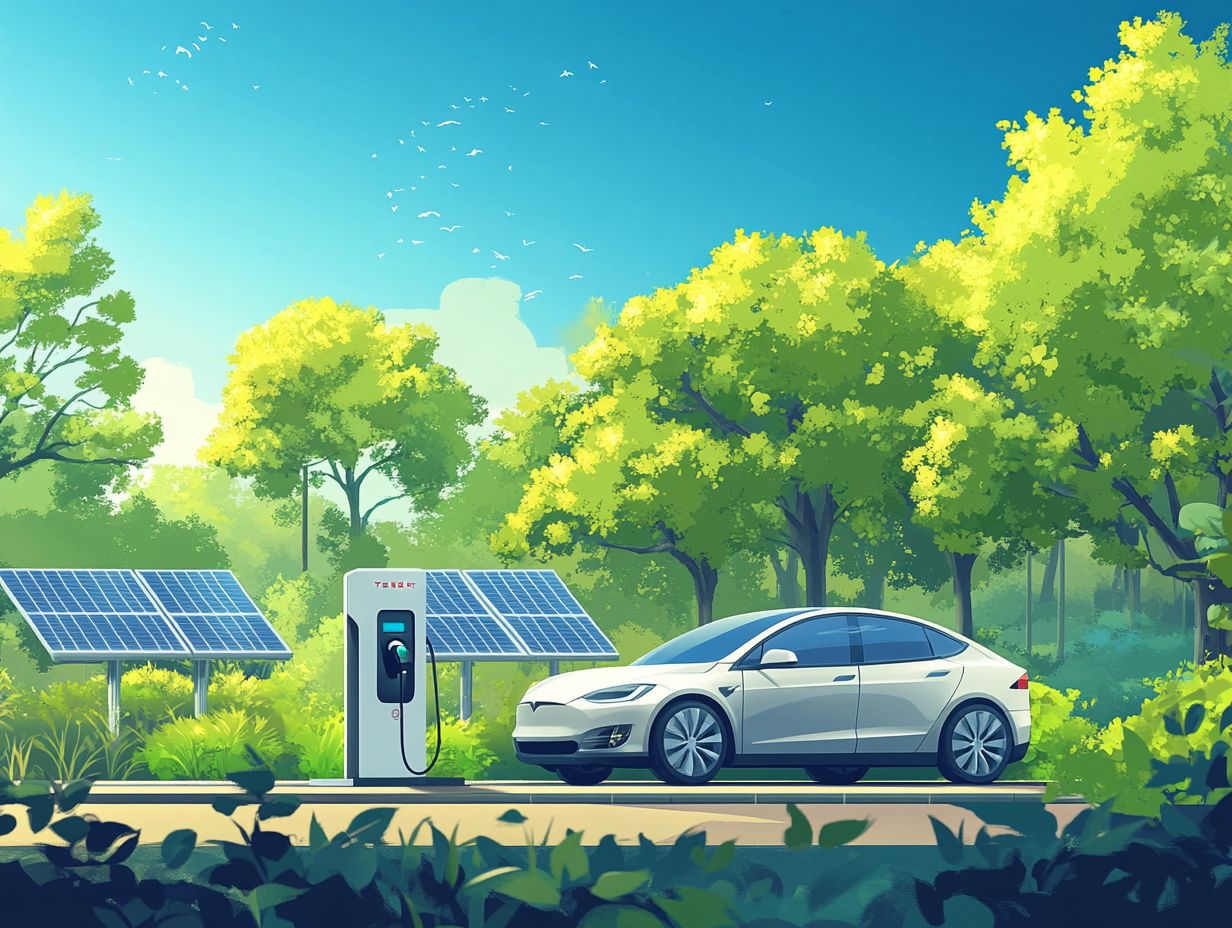
One of the primary advantages of electric vehicles is their remarkable capacity to significantly reduce greenhouse gas emissions. This shift decreases reliance on fossil fuels in the transportation sector.
This reduction is vital since transportation ranks among the leading contributors to air pollution and climate change. Moving away from traditional gasoline and diesel engines helps lower CO2 emissions and contributes to a cleaner atmosphere.
Embracing electric mobility diminishes dependence on fossil fuels, paving the way for a transition to renewable energy sources. The growth of the electric vehicle market encourages investments in sustainable infrastructure and energy efficiency, aligning with broader goals of combating climate change and nurturing a green economy.
Electric vehicles are a significant leap toward achieving energy independence and ensuring a healthier planet for future generations.
Improving Air Quality and Public Health
The adoption of electric vehicles is crucial for enhancing air quality in urban areas. This is a key factor in safeguarding public health and reducing the incidence of respiratory diseases tied to air pollution.
As fewer fossil fuel-powered cars navigate congested city streets, harmful emissions like nitrogen oxides and particulates drop significantly. This results in a healthier atmosphere. Cleaner air not only alleviates conditions like asthma but also boosts overall well-being, leading to increased productivity among city residents.
Shifting to electric vehicles aligns with broader urban sustainability goals. Supporting greener transportation options helps lower greenhouse gas emissions. These collective advantages highlight the vital role of electric mobility, as discussed in the role of research in advancing electric vehicles, in fostering healthier cities, ultimately paving the way for a brighter and more sustainable future.
Challenges and Limitations of Electric Vehicles
Despite the many advantages of electric vehicles, one may encounter several challenges and limitations. Here are some common challenges you may face:
- High initial costs
- The necessity for a robust charging infrastructure
- Improvements in battery performance that are crucial for broader adoption
Infrastructure and Cost
The lack of adequate charging infrastructure poses a significant barrier to the adoption of electric vehicles. This is compounded by the higher initial costs associated with these vehicles compared to conventional options.
As both consumers and potential manufacturers, it’s essential to acknowledge that the existing network of charging stations falls short of meeting the increasing demand for electric vehicles. This gap discourages buyers and raises concerns about practicality, especially in areas with limited charging points.
When considering the switch to electric, factors such as convenience and the availability of charging solutions weigh heavily on one s mind. Investing in charging infrastructure could pave the way for reduced long-term costs, enhancing the financial viability of electric vehicle ownership and promoting broader acceptance in everyday transportation.
Government Initiatives and Incentives for Electric Vehicles
Governments around the globe are rolling out a range of initiatives and incentives designed to promote the adoption of electric vehicles. They understand that these vehicles are pivotal in fostering sustainable practices and significantly reducing transportation emissions.
Explore your options today and be part of the change for a sustainable tomorrow!
Support for Adoption and Development
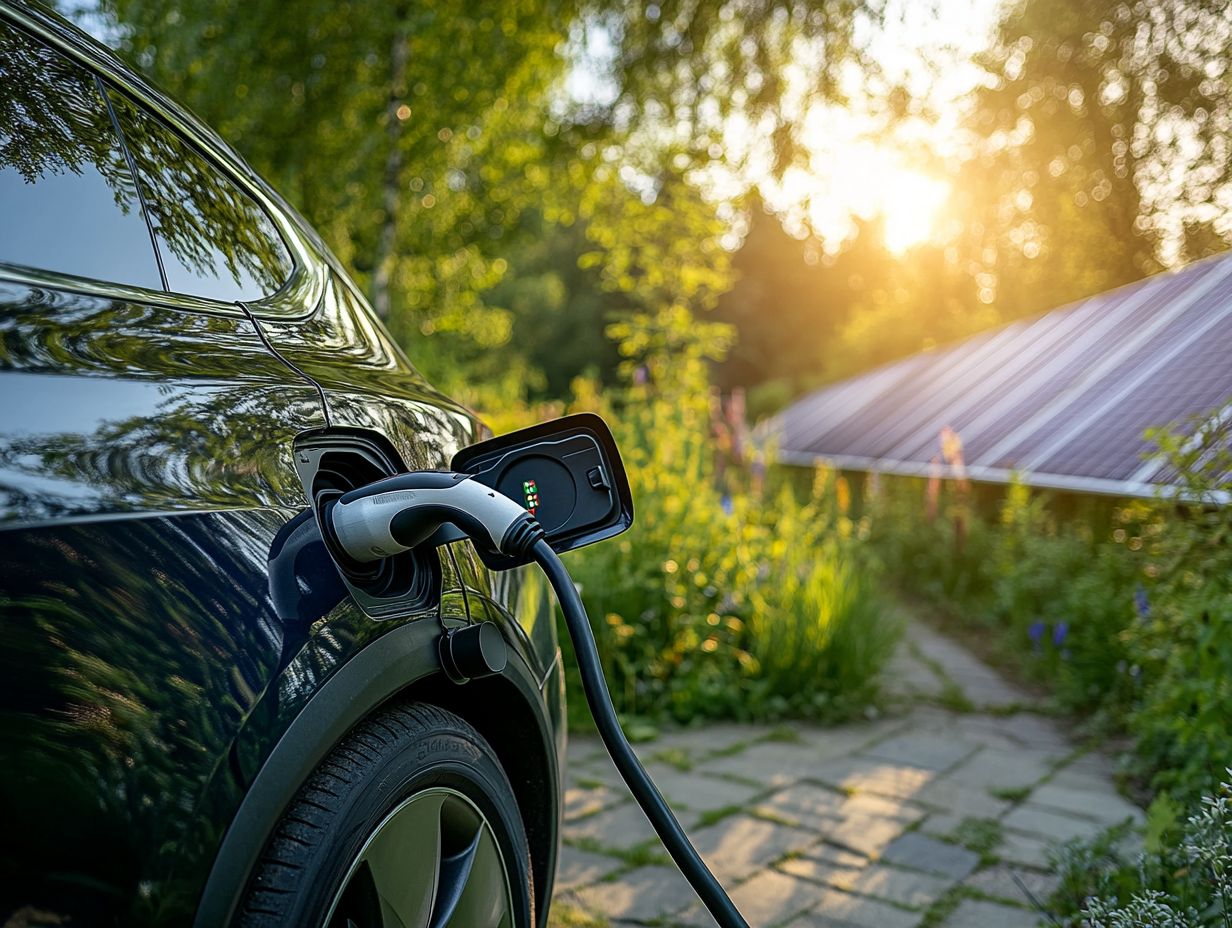
Support for your electric vehicle adoption comes in many forms. This includes financial incentives, grants for research and innovation, and policies designed to boost the electric vehicle industry.
Many governments are stepping up to offer tax rebates and subsidies that make electric vehicles more affordable. Numerous grant programs support companies innovating in battery technology and infrastructure development.
These initiatives lower your initial costs as a consumer and pave the way for new manufacturing plants and research hubs. This ultimately generates thousands of jobs in engineering, production, and maintenance.
The ripple effect of these policies is substantial. They enhance the job market while positioning the nation as a leader in the rapidly evolving electric vehicle sector!
Future Outlook for Electric Vehicles
The future of electric vehicles presents a promising landscape, characterized by continuous technological advancements, notable enhancements in battery recycling methods, and a robust global movement towards clean energy transitions.
Advancements in Technology and Potential Impact
Advancements in battery technology are essential for elevating the performance and affordability of electric vehicles. They significantly influence clean energy transitions and foster a circular economy, which means creating a system where resources are reused and recycled.
As you explore innovations in battery materials and chemistries, you ll discover that they lead to longer-lasting batteries with faster charging capabilities and reduced production costs. These improvements not only encourage wider consumer adoption but also contribute to a more sustainable transportation framework.
By reducing reliance on finite resources, these developments resonate with eco-friendly practices and promote the efficient recycling of battery components. This enables automakers to comply with stringent emissions regulations while driving further investment in renewable energy sources, ultimately cultivating a more resilient and environmentally responsible industry.
Frequently Asked Questions
1. What is the role of electric vehicles in sustainable development?
Electric vehicles play a crucial role in sustainable development by reducing greenhouse gas emissions, promoting energy efficiency, and decreasing dependence on fossil fuels, as outlined in the role of electric vehicles in sustainable transportation.
2. How do electric vehicles contribute to reducing greenhouse gas emissions?
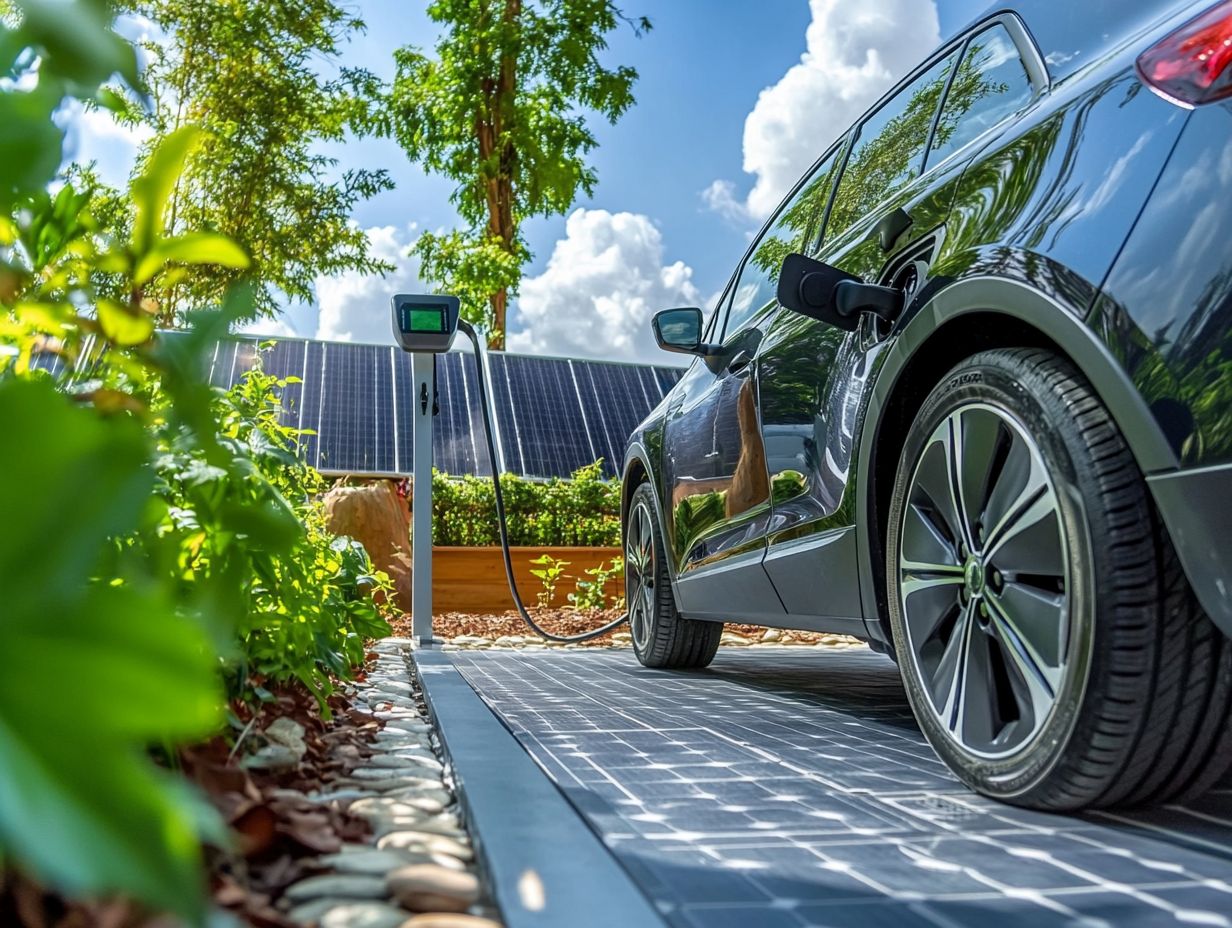
Electric vehicles produce zero emissions, which helps to reduce the amount of greenhouse gases released into the atmosphere, thus mitigating the effects of climate change.
3. Can using electric vehicles really make a difference in promoting sustainable development?
Yes, electric vehicles have the potential to make a significant impact in promoting sustainable development. They reduce air pollution, conserve natural resources, and support renewable energy sources.
4. Are electric vehicles more energy-efficient than traditional gasoline vehicles?
Yes, electric vehicles are more energy-efficient because they convert over 90% of the energy from their batteries into powering the vehicle. In contrast, gasoline vehicles only convert about 20% of the energy from gasoline into power.
5. How do electric vehicles contribute to reducing dependence on fossil fuels?
Electric vehicles use electricity as their primary source of energy, which can be generated from renewable sources such as solar, wind, or hydro power. This reduces our dependence on fossil fuels for transportation.
6. Are there any other benefits of using electric vehicles for sustainable development?
Electric vehicles are great for the environment because they cut down on emissions. They also have lower running costs and need less maintenance than traditional gasoline vehicles.
This means more savings for both individuals and businesses. In turn, this contributes to sustainable economic growth!

